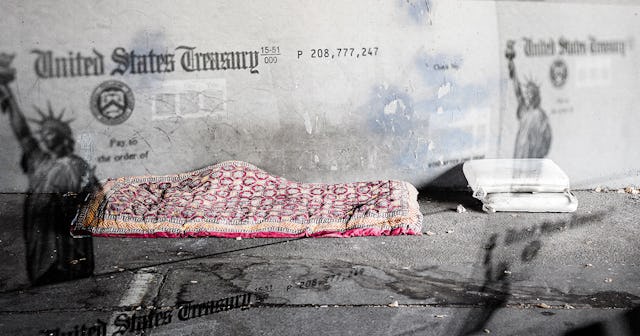It's Hard To Get A Stimulus Check When You're Houseless

My wife and I didn’t receive the first two rounds of stimulus checks. We were confused at first, and then angry, and then confused again as to why. I checked the IRS stimulus tool multiple times a day. It was frustrating to say the least. And then 2021 arrived, and along with it a new president, and BAM — we received the 3rd round of stimulus checks. I am grateful we received it this year, and it definitely has helped my family. Even without the payment, though, I’m fortunate to say that my family would still have food on our table and a roof over our heads.
But what about those who don’t have a home, or a bank account, and are unable to keep their stomachs filled with food at every meal? The organization End Homelessness reported that in 2019, there were over 567, 000 people who spent the night without a home, a roof over their heads. That’s over half a million people and families who are unable to receive their stimulus payments because they are houseless. Which is devastating, because for those in this situation, one payment of $1,400 can be life changing in so many ways.
We often think of only the most obvious problems that houseless folks face — gaining access to basic necessities. But houselessness presents unique challenges far beyond securing food and housing.
When it comes to receiving their economic impact payments, those who are houseless have more hoops to jump through than the rest of us. There are things that some of us take for granted when dreaming about what we’d do with an extra $1,400: like the fact that we have bank accounts, or access to the internet to check the IRS tool, or an address.
Many of us were able to receive a direct deposit of our stimulus payment directly into our bank accounts. But for houseless people, who don’t have a bank account, even the alternate method of receiving a paper check can be an additional problem. In order to receive a paper check which is delivered in the mail, a person needs an address to use.
In an effort to help houseless people receive what is rightfully theirs, there are organizations and shelters which allow people who reside there to use their business address as a home address. In New York state, there is an organization called the Coalition for the Homeless. The organization provides houseless individuals with a safe and secure location to send important documents, like stimulus checks.
Michal_Eyal/Getty
But there are more boxes to check than simply having a physical address. In order to claim stimulus payments, those who are houseless must have filed a tax return for the previous year. If they haven’t, there are organizations out there helping to get them one step closer to being eligible to receive their stimulus checks, even the IRS. Jodie Reynolds, a spokeswoman for the IRS, states that the IRS is, “working aggressively with partner groups inside and outside the tax community to help as many people, including those in the houseless community, receive the stimulus payments as possible,” according to a report in USA Today.
The IRS is working hard to not be a barrier for those in need of their stimulus checks. People who do not have access to the internet can call their local United Way 2-1-1 number and receive information as to where to go to access the IRS stimulus tool. There are millions of people who do not need to file their income taxes because their income is too low and it is not necessary. The IRS does not require people whose income falls below $12,200 to file an income tax return. But for individuals who do not need to file an income tax return, they have an additional hoop to jump through in order to receive their stimulus check: they must use the IRS’s “Free File” form (after securing internet access, of course) and enter their identifying information (such as their social security number). After that, they can receive the payments they’re eligible for through the “Recovery Rebate Credit.”
Even if they aren’t houseless, the number of people who didn’t file taxes, and are therefore missing out on the stimulus payments, is about 12 million, according to the Center on Budget and Policy Priorities. Of those, about 9 million people receive SNAP or Medicaid benefits. And this disproportionately affects communities of color, which have already been dealt a heavy blow by the impact of COVID-19. “Twenty-seven percent of the 9 million people are Black — higher than their share of the U.S. population (12 percent) — while another 19 percent are Latino. Ensuring that low-income people of color receive the payments for which they qualify is especially important given emerging evidence that they are being hit hardest by both the economic and health effects of the pandemic.”
There are organizations out there who are eager to help, who want to be of assistance to those in need. When a houseless person receives their stimulus payment, they have money in their hands to help them, to get them food, to pay for a warm place to sleep — or any number of basic necessities they lack. Their lives may literally depend on it.
This article was originally published on